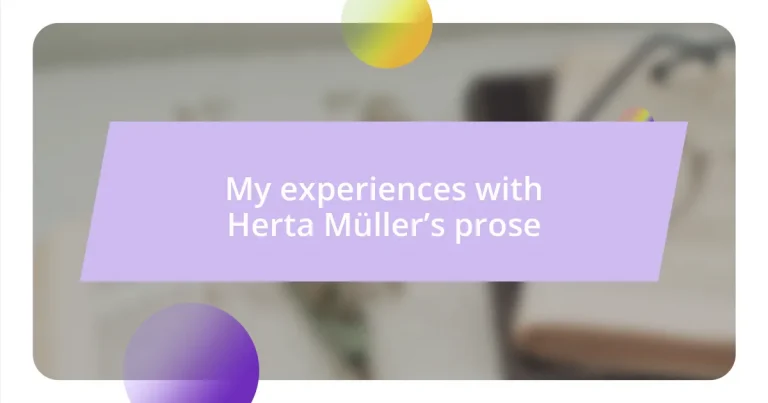Key takeaways:
- Herta Müller’s background as a Romanian-German writer influences her exploration of themes like totalitarianism, individuality, and alienation in her prose.
- Her use of literary techniques such as stark imagery, repetition, and sparse dialogue enhances the emotional depth of her narratives.
- Personal reflections on Müller’s work highlight the connection between her portrayal of isolation and the reader’s own experiences, evoking empathy and self-exploration.
- Recommended readings include “The Hunger Angel” and “Niederungen,” alongside critical studies that deepen understanding of her work’s themes and styles.

Understanding Herta Müller’s background
Herta Müller was born in 1953 in a small village in Romania, a context that deeply influenced her literary voice. Growing up in the German-speaking minority amidst political repression, I can’t help but reflect on how this kind of environment shapes a person. Have you ever wondered how one’s childhood can dictate their path in life? For Müller, it fostered a profound sensitivity to language and power.
She faced intense scrutiny and oppression under the Ceaușescu regime, which prompted her to confront the complex interplay between totalitarianism and individuality. I often think about the courage it must have taken for her to leave Romania in 1987, choosing exile in Germany rather than remaining silenced. How would we respond to such a demand for freedom? Her experiences of alienation and dislocation vividly color her prose, making her narratives resonate deeply with readers who’ve faced challenges of their own.
Müller’s work often draws heavily from her past, a tapestry woven with themes of loss and memory. I remember the first time I read her descriptions of the oppressive atmosphere—each word seemed to echo my own feelings of unease in unfamiliar places. Isn’t it fascinating how literature can bridge our experiences, connecting us to someone else’s pain and resilience? This connection is precisely what makes her background so essential to understanding the depth of her writing.

Analyzing language and style techniques
Müller’s prose is marked by its stark imagery and dense metaphors, which often elevate the emotional weight of her narratives. I remember being struck by a particular scene where she uses common objects to symbolize profound feelings of displacement. It made me reflect on my own life—how everyday items can stir up memories and emotions. Have you ever felt a simple object hold more meaning than it seems? It’s this kind of exploration that draws readers into Müller’s world.
A notable technique Müller employs is repetition, which creates a rhythmic cadence that emphasizes the urgency of her themes. When I first encountered this in her work, it felt almost musical, reminding me of a poignant song that lingers in my mind. Each repeated phrase was like a heartbeat, pulsing with the pain of experience and the weight of unspoken words. It’s a technique I’ve found powerful in conveying deep emotional truths.
Furthermore, her use of sparse dialogue often leaves a haunting silence that speaks louder than words. I vividly recall a moment in one of her stories where a conversation is reduced to barely more than whispers, forcing me to pay closer attention to the unsaid. This technique not only mirrors the oppressive atmosphere she lived through but made me ponder how silence can be as powerful as spoken language. Have you experienced those moments where what remains unspoken holds more significance than what is shared?
| Language Technique | Description |
|---|---|
| Stark Imagery | Vivid visual descriptions that enhance emotional resonance. |
| Repetition | Rhythmic reuse of phrases to emphasize emotional urgency. |
| Sparse Dialogue | Minimalistic conversations that highlight the weight of silence. |

Reflecting on personal emotional responses
Reflecting on my emotional responses to Herta Müller’s prose evokes a blend of disquiet and connection. Each page feels like a mirror, reflecting my own fears and joys. I clearly recall sitting in my favorite reading nook, the rain tapping against the window, as Müller’s words pierced through my distractions. I felt an intense wave of empathy surge within me, akin to recognizing a kindred spirit in her struggles. The weight of her narratives lingers long after I’ve put the book down, continuously reshaping my perception of pain and resilience.
- Müller’s portrayal of isolation resonated with my own experiences of feeling out of place.
- Her stark imagery often leaves me pondering the ambiguity of grief and hope.
- Those moments of silence in her dialogues remind me of times when I’ve struggled to articulate what I truly felt.
- Each encounter with her work compels me to explore my emotional layers further, making me reflect on my own complexities.

Identifying impactful quotes and passages
Identifying impactful quotes and passages in Herta Müller’s work feels like uncovering hidden gems that resonate deeply within me. One passage I found striking was when she wrote about the weight of silence in oppressive environments. It was during a quiet evening, absorbed in her prose, that I realized how her words echoed my own experiences of feeling unheard and invisible. Can you recall a moment when a mere phrase shifted your perspective entirely? That’s the magic of Müller’s prose; it captures profound truths in the simplest of expressions.
I often revisit the haunting imagery she employs, especially those passages where she describes ordinary settings layered with tension. There’s a scene where she evokes a dilapidated house, each creak of the floorboards echoing the ghosts of the past. I couldn’t help but relate it to my childhood home, filled with the memories of laughter and sorrow. It made me wonder, how much of our past do we carry with us in these spaces we inhabit? Her ability to weave such vivid connections is what leaves me contemplating long after I close the book.
Then there are the moments where her repetition of certain phrases struck a chord in my heart. I remember reading a sentence that looped like a mantra, resonating with my sense of longing. It reminded me of how we sometimes cling to words that encapsulate our innermost feelings, almost like lifelines in tough times. Have you ever found comfort in a repeated line in a book, feeling as though it was written just for you? In those passages, Müller doesn’t just write; she reaches out, touching the core of what it means to be human.

Recommending further readings and resources
When diving deeper into Herta Müller’s world, I highly recommend her novel, “The Hunger Angel.” This book had me feeling a spectrum of emotions as it beautifully captures themes of loss and survival. I remember getting lost in its pages, almost feeling the weight of hunger mirrored in my own experiences of craving connection. Have you ever found a book that felt so personal, as if it was written just for you? For me, “The Hunger Angel” was that touchstone.
Another resource worth exploring is her collection of short stories, “Niederungen.” Each tale is a window into her world, showcasing her masterful use of language. I once shared a passage from this collection during a book club discussion, and the silence that followed spoke volumes about its emotional impact. Isn’t it fascinating how shared reading can foster such deep connections? I urge you to take the plunge and read it with an open heart, ready to reflect on your own life experiences.
If you’re looking for critical insights, consider picking up “Herta Müller: A Critical Study.” This resource offers a comprehensive analysis of her themes and styles, enriching your understanding of her work. I found it helpful to compare my intuitive responses with academic interpretations, which opened new layers of appreciation for her prose. Have you ever had an epiphany while reading a critique that changed how you view an author’s work? It can be incredibly illuminating, and I believe it will enhance your journey through Müller’s evocative narratives.














